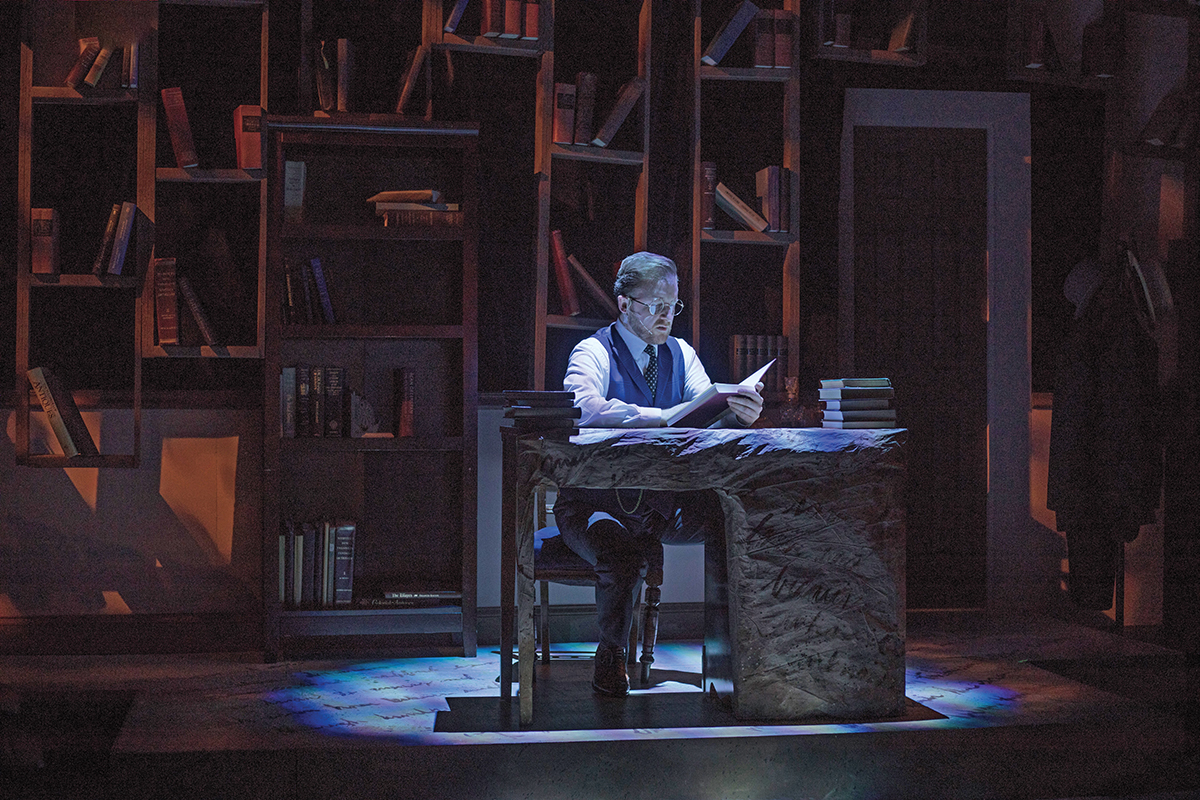Theater Review: Monumental Theatre’s ‘Daddy Long Legs’
Monumental's "Daddy Long Legs" offers a refreshing taste of the modern in its old-fashioned fairy tale

Defying most expectations of an awkward return to the outdated era of fairy tales about bright young women being groomed for marriage by rich, adoring, older men, John Caird and Paul Gordon’s Daddy Long Legs (★★★) presents its protagonist Jerusha Abbott as a thoroughly modern woman of the early 20th-century.
Caird and Gordon’s two-person musical, which premiered in 2009, sidesteps the skeevy vibe of the classic ’50s film version starring Fred Astaire and Leslie Caron, who was 32 years Astaire’s junior. In this streamlined adaptation of Jean Webster’s 1912 novel, Jerusha (Caroline Wolfson), the oldest orphan at the John Grier Home in 1908, and Jervis Pendleton (Kurt Boehm), the wealthy benefactor who anonymously funds her college education, are depicted, to some degree, as generational peers. Jerusha’s growth as a person stays centered, as opposed to her sponsor’s amorous interest in her.
That balancing of the scales more rigorously reflects Webster’s progressive intent, which, in turn, is reflected well in Monumental Theatre’s production of the epistolary tale, staged by Michael Windsor. Still, the play is not without its problems, as is also the case for the production.
Where the play’s concerned, one major stumbling block is Jerusha’s pet name for the man whom she glimpses one day walking out of the John Grier Home. He’s a trustee of the orphanage, who, having read some of her essays, decides to invest in her development as a writer. He’ll pay for her education at a fine New England women’s college, as well as her personal expenses, and in return wants not thanks but merely the acknowledgement of a monthly letter from her addressing him as “John Smith.” But, recalling him only as the tall, spindly silhouette in headlights she glimpsed that day, she fondly dubs him “Daddy Long Legs.”
Jerusha excitedly recites her letters to Daddy, her greetings progressing from ‘Dear’ to ‘Dearest,’ and it’s hard in the #MeToo era not to cringe. At best, the Daddy-and-me dynamic affords orphaned Jerusha a much-desired father figure, though a stern one, who ensures she feels seen and heard and that she ultimately can cultivate a comfortable life for herself. On the other hand, a teenager singing her love for “Dearest Daddy” stirs up connotations of inappropriate relationships and less consenting versions of daddy’s little girl. The D-word’s been sexually charged since long before Marilyn Monroe shimmied around a stripper pole clad in a tight cable-knit cooing “My Heart Belongs to Daddy.”
Jerusha’s innocent young heart belongs to a Daddy who’s not only distant and silent, never responding to her letters, but who’s oftentimes dictatorial in his attempts to hold her to his nine-year plan for her further education. Yet, she defies him constantly, and always speaks, or writes, her mind.
Caird’s script, Windsor’s direction, and Wolfson’s appealing turn emphasize Jerusha’s attractiveness not as a sex object, but as a caring, thoughtful, funny, and open-minded individual. She wins over her silent sponsor through the wit and directness of her writing, conveyed concisely via Gordon’s lyrics and soaring melodies in songs like “Things I Didn’t Know,” a tender ode to owning her ignorance as the launching point for improving herself. Wolfson wins over the audience by supplying Jerusha’s sparkling voice and personality, aided by first-act staging that, for the most part, parks Jervis on his side of the stage, while she ranges around Jessica Cancino’s letters-strewn set.
Drawn out of his silence, Jervis gradually takes on a more active role in the story, and Boehm nicely illuminates the guardian angel’s transition from aloof to smitten. While his vocal performance might be limited in its musicality, he and Wolfson duet well together, and their spoken timing is impressive as they sometimes recite in tandem different words and snippets from Jerusha and Jervis’ volleying correspondence.
What’s more impressive is that Jerusha still has so much to say that’s relevant to what it means to be modern today. She cares about education and voting and human rights and a woman being able to have the same agency, opportunities, and independence as any man. Progressive for a woman of her day, she recognizes her worth as a person irrespective of whatever choice she’ll make about whom to marry, or if she’ll marry. In her words, the secret to happiness begins with learning. There’s never a wrong time for that message, and Monumental’s production delivers it soundly.
Daddy Long Legs runs through March 30 at Ainslie Arts Center, Episcopal High School campus, 3900 W. Braddock Rd., Alexandria. Tickets are $40. Visit www.monumentaltheatre.org.
Support Metro Weekly’s Journalism
These are challenging times for news organizations. And yet it’s crucial we stay active and provide vital resources and information to both our local readers and the world. So won’t you please take a moment and consider supporting Metro Weekly with a membership? For as little as $5 a month, you can help ensure Metro Weekly magazine and MetroWeekly.com remain free, viable resources as we provide the best, most diverse, culturally-resonant LGBTQ coverage in both the D.C. region and around the world. Memberships come with exclusive perks and discounts, your own personal digital delivery of each week’s magazine (and an archive), access to our Member's Lounge when it launches this fall, and exclusive members-only items like Metro Weekly Membership Mugs and Tote Bags! Check out all our membership levels here and please join us today!



























You must be logged in to post a comment.